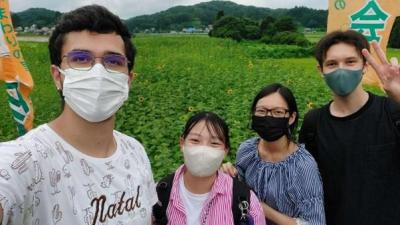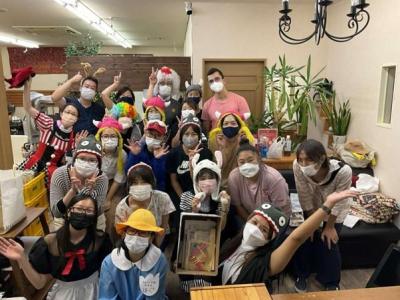

日本語の授業で、ワーキングスタッフとして参加していた日本人の学生と仲良くなりました。夏休みの間、彼女は半田さんという方のところでインターンシップをしていて、私を紹介してくれました。半田さんは、NPO法人チーム福島の代表理事で、福島市の人材採用・教育研究所の所長でもあります。彼は、「福島ひまわり里親プロジェクト」の一員で、私たち留学生を特別なイベントや場所に連れて行ってくれました。
そのプロジェクトでは、ひまわりを福島県の復興のシンボルとして使っています。そこで、日本中の人が里親となってひまわりを育て、収穫した種を応援メッセージとともに福島県に送り返すことができるのです。雇用の創出や絆づくり、防災教育にもつながる取り組みです。さらに、この種から作られた油は、福島県内のバスの燃料として使用されています。その過程で、障害のある方や震災で職を失った方々の雇用も生まれています。また、広大で美しいひまわり畑は、「ひまわり結婚式」などの観光資源にもなっています。
田村市の佐久間さん(福島ひまわり里親プロジェクト)の牧野ひまわり畑で、パンデミック以来3年ぶりにひまわり結婚式に出席することができました。今年は3県から4組のカップルが福島にやってきて、結婚式を挙げました。
もう一つ、佐久間さんや「牧野ひまわり会」の皆さんが育てている植物は、ひまわりだけではありません。アジサイやコスモスなどの花以外にも、約50種類の珍しい作物を栽培しており、福島県で初めてパッションフルーツの栽培を始めたのも佐久間さんです。当時、たまたま外国人の友人が日本でパッションフルーツを探していて、佐久間さんの庭でパッションフルーツのつるを見たことを思い出しました。半田さんにパッションフルーツが買える場所を聞いたら、まさか地元の農家から袋いっぱいのパッションフルーツが届くとは思ってもいませんでした。そんなわけで、日本で懐かしい故郷の植物が見つからなかったら、佐久間さんの農園を覗いてみることをお勧めしますよ。
半田さんが所属していたボランティアイベントが、いわゆるBLT子ども食堂で行われたことがあり、私ともう一人の友人が参加しました。BLT子ども食堂とは、ペイフォワード方式で、困っている子どもたちに無料で食事を提供するレストランのようなものです。そこで、年齢も地域もさまざまなボランティアと一緒に、小さなお子さんのいるご家庭にお弁当を配りました。当日お会いした方々は皆、心温まる方ばかりでした。子どもたちはお礼の手紙を持ってきてくれたり、暑い中、ボランティア全員がわざわざ仮装をして、子どもたちに楽しんでもらえるような活動をしてくれたり、魅力的でした。
また、この日は何百人もの人が行き交う忙しい日でしたが、それだけに、到着した人を効率よく空いている駐車場に誘導するヘルパーさんの姿は、日本の秩序をより印象付けました。
その日、半田さんは福島市のコミュニティフリッジひまわりも見せてくれました。冷蔵庫といっても、実は冷蔵庫を含めたアパート一棟で構成されています。国際交流会館から北に20分ほど歩いたところにあるのですが、ここは隠れ家的なアパートとなっています。その目的は、パンデミックなどそれぞれの事情で日常生活に支障をきたしている人たちを支援するためです。利用者は人目を気にすることなく、安全に無料で食料品や日用品を手に入れることができます。
また、登録した人なら誰でも物資を寄付することができます。そのため、もし買いすぎたものなどがあれば、コミュニティフリッジひまわりに寄付することで地域貢献ができます。
コミュニティフリッジひまわりを利用することができるのは、日本人だけではありません。私たちのような留学生も、アプリを使って申し込むことができますよ。万が一、お金に困ったときに心強いですね。
特に2011年の東日本大震災以降、福島県は全国と全世界の多くの人から支援を受けてきました。そのため、「困ったときはお互いさま」の精神のもとに、助け合うことを学びました。そこで、「コミュニティフリッジひまわり」や「BLT子ども食堂」といったプロジェクトが生まれました。
福島県で半年以上過ごしてみて、福島県と福島県民を表すのに「お互いさま」という言葉ほどふさわしい言葉はないと断言できます。この地域の人々は、助けに対する感謝の気持ちを知っているので、彼らがどれほど親切で思いやりがあるか、きっと驚くことでしょう。
【英語訳】
Some more useful knowledge that I acquired in the past few months
In one of the Japanese classes, I became friends with one of the Japanese students who participated in the class as a working staff. During the summer holidays, she was doing an internship for someone called Handa-san and introduced me to him. Among other things, he is the President of the NPO Team Fukushima and the Director of the Recruitment and Education Institute in Fukushima City. He is part of the Fukushima Sunflower Foster-Parent Project and kindly offered to take us international students to special events and places.
That project uses the sunflower as a symbol of Fukushima Prefecture's revitalization. Therefore, people from all over Japan can become so-called foster parents, grow sunflowers, and send the harvested seeds along with encouraging messages back to Fukushima Prefecture. It is an initiative to create jobs, build bonds, and educate people about disaster prevention. Furthermore, the oil made from the seeds is used as fuel for buses in Fukushima Prefecture. Throughout the process, jobs for people with disabilities or those who lost their jobs due to the disaster have been created. The vast and beautiful sunflower fields also serve as tourist attractions such as for the Sunflower Wedding.
I was lucky to attend the first Sunflower Wedding in three years since the pandemic at Sakuma-san's (also part of the Fukushima Sunflower Foster-Parent Project) Makino Sunflower Field in Tamura City. This year, four couples from three different prefectures came to Fukushima to hold their wedding.
On another note, sunflowers are not the only plants that Sakuma-san and the members of the Makino Sunflower Association grow. Apart from flowers like hydrangeas and cosmos, he also grows about 50 kinds of rare crops and was the first person to start growing passion fruits in Fukushima Prefecture. One of my international friends happened to be looking for passion fruit in Japan at the time, and he remembered seeing a passion fruit vine in Sakuma-san's garden. We never expected to receive a whole bag of passion fruits from a local farmer when we asked Handa-san where we could buy passion fruits. For that reason, I suggest you check out Sakuma-san's farm if you cannot find a plant from home that you miss in Japan!
On one of the occasions on which a volunteering event that Handa-san was affiliated with took place at the so-called BLT Café, me and another friend participated. It is a kind of restaurant that utilises a pay-forward system to allow children in need to get meals for free. There, together with other volunteers of all ages and regions of Japan, we distributed bento boxes to families with young children. All the people whom we met that day were heartwarming. The children brought letters of appreciation and even though it was really hot, all the volunteers went out of their way to dress up in costumes or the like to make the activities even more enjoyable and appealing to the children.
On a side note, it was a busy day with hundreds of people coming and going, but for that reason, I was even more impressed by the Japanese orderliness that was particularly evident from the helpers who efficiently guided all arrivals to free parking lots.
That day, Handa-san also showed us the Community Fridge Himawari of Fukushima. Although it is called a fridge, it in fact comprises a whole apartment including the fridge. It's about a 20-minute walk north of the International House, but the apartment itself is actually rather covert. The purpose behind it is to help people who face difficulties in their daily lives due to various circumstances, for example the pandemic. They get access to free food and daily necessities safely and without worrying about being seen.
Vice versa, anyone registered can donate goods. Therefore, if you happen to have too much of something, you can contribute to the community by donating it to the Community Fridge.
However, not only Japanese citizens can get access to the Community Fridge. Students like us can also sign up for it using an application. That's quite reassuring to know in case you are ever pressed for money.
Especially since the Great East Japan Earthquake in 2011, Fukushima Prefecture has received support from many people across the country and around the world. Thus, they learned to help each other in the name of "Mutual Support" (お互い様) in times of trouble. Therefore, projects like the Community Fridge and the BLT Café came into existence.
After spending more than half a year in Fukushima, I can say with certainty that no term is more suitable for describing Fukushima and its people than お互い様. People here know how to appreciate help, so you will definitely be surprised by how helpful and caring they are.